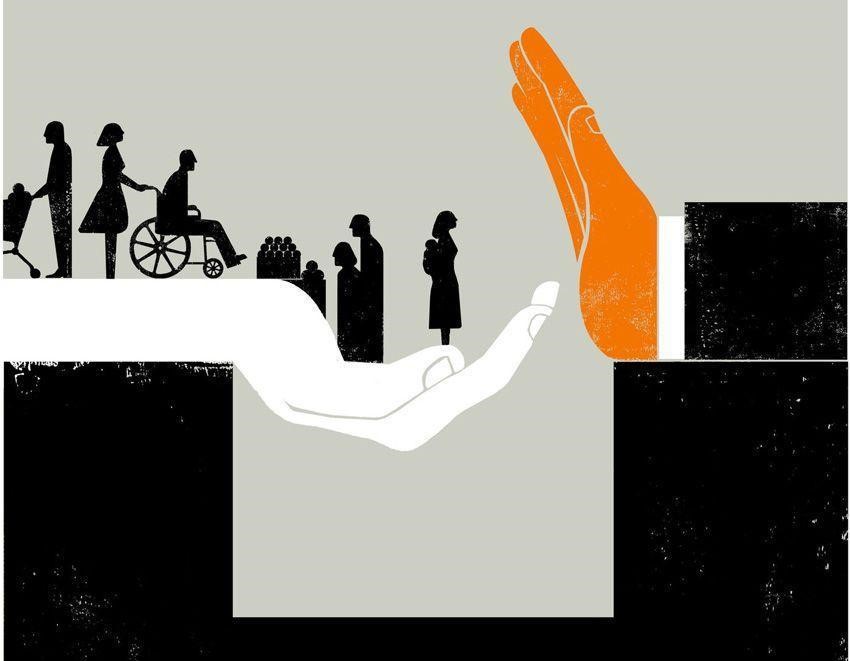2019 Public Charge Rule Ended by DHS
“The 2019 public charge rule was not in keeping with our nation’s values. It penalized those who access health benefits and other government services available to them. Consistent with the President’s vision, we will continue to implement reforms that improve our legal immigration system.”
- 2019 Public Charge Rule Vacated and Removed; DHS Withdraws Proposed Rule Regarding the Affidavit of Support
- DHS Secretary Statement on the 2019 Public Charge Rule (3-09-21)
- DHS Statement on Litigation Related to the Public Charge Ground of Inadmissibility
(3-09-21)
Applicants for immigration benefits are no longer required to submit form I-944. The rest of this webpage is now history.

Application of Public Charge Rule: Primarily Dependent vs Likely Receipt
The term “likely at any time to become a public charge” is a ground of inadmissibility found in INA § 212(a)(4). The new rule redefines what this means in the following way:
The public charge ground of inadmissibility used to apply only to persons who might become “primarily dependent” on designated state and federal programs for more than half of their income or support. The new rule broadens the definition to apply to those who are determined to be more likely than not to receive a broader list of benefits for more than 12 months in the aggregate within any 36-month period.
Client Reviews

It Was Worth Every Penny
“Our experience with the Law Offices of Carl Shusterman began with a phone conference with Mr. Shusterman himself, which lasted about an hour. We were assigned to the team of Attorney Jennifer Rozdzielski and Ana Cruz. The situation was not an easy one, and it took about three years and a myriad of paperwork to resolve. We got to know both Jennifer and Ana very well in the process. They stayed positive and kept us on track with all the papers and forms and documentation required. I have to say that we were treated like family, and they were excited when we finally achieved our dreams. We are so glad we chose them – it was worth every penny!!”
- James Baker, Portland, Oregon
Read More Reviews
Zoom Consultations Available!
Form I-944 – Declaration of Self-Sufficiency
The USCIS issued a new 18-page I-944 form entitled Declaration of Self-Sufficiency which must be filed with applications for Adjustment of Status starting February 24, 2020 for persons who are subject to the rule. This form will be required for most persons in the family-based, employment-based and diversity lottery categories.
- I-944 – Declaration of Self-Sufficiency
- I-945 – Public Charge Bond
- I-356 – Request for Cancellation of Public Charge Bond
Who is Affected by the New Public Charge Rule?
The new rule does not create a new ground for deportation, but reinterprets an existing ground of inadmissibility. If you are applying for either a temporary visa or for a green card, chances are that the new public charge rule will apply to you. The same is true if you are applying for an extension of status or a change of status.
If you already have a green card, the new rule will not affect you unless you leave the U.S. for 180 days or more, and attempt to return. Applicants for naturalization will not be affected. Neither are persons who receive public benefits while they are in any of the following categories:
- Asylees and Refugees;
- Special Immigrant Juveniles (SIJS);
- Persons with T Status (Victims of Human Trafficking);
- Persons with U Status (Crime Victims);
- Persons with VAWA (Violence Against Women Act);
- Persons with NACARA;
- Persons with Registry;
- Persons with the Cuban Adjustment Act; and
- Applicants for Temporary Protected Status.
Addition of 5 New Benefit Programs
The new rule expands the list of state and federal programs that can be considered when applying the public charge test.
Previously, the agency only considered the following 4 programs:
- Supplemental Security Income (SSI)
- Temporary Assistance to Needy Families (TANF)
- State General Relief or Assistance
- A Medicaid program that covers institutionalization for long-term care
The new rule adds the following 5 additional programs to the list:
- Non-Emergency Medicaid
- Supplemental Nutrition and Assistance Program (SNAP, formerly food stamps)
- Section 8 Housing Choice Voucher Program
- Section 8 Project-Based Rental Assistance
- Public Housing
Focus on 5 Statutory Factors
Under the new rule, government officers will shift attention away from the petitioning sponsor’s income and focus instead on the following 5 factors:
- Age: Applicants younger than 18 or older than the minimum early retirement age for Social Security (62) will need to demonstrate why their age will not impact their ability to work.
- Health: Applicants will need to show whether their medical conditions will affect their ability to work and care for themselves.
- Family status: Applicant’s household includes dependents and persons providing the applicant with more than 50 percent of support.
- Asset, resources and financial status: Whether the annual household income is at least 125% of the Federal Poverty Guidelines, given the new household definition. Financial status will be measured by civil liabilities, credit history and credit score, past applications for or receipt of public benefits, an application for or receipt of a fee waiver for an immigration benefit after the effective date.
- Education and skills: Whether the applicant has adequate education and skills to obtain lawful employment with an income sufficient to avoid becoming a public charge. Factors include employment history, education level, occupational skills and licenses, English proficiency and the status of the applicant as a primary caregiver to another individual in the household.
The new rules require that DHS and DOS consider the totality of the circumstances and make a forward-looking determination of whether applicants for an immigrant or nonimmigrant visa, applicants for admission to the US, and applicants for adjustment of status are likely to become a public charge “at any time” in the future. The DHS regulation also introduces a related condition for change of status and extension of stay nonimmigrant applicants, who will have to demonstrate that “since obtaining the nonimmigrant status they seek to extend or change, until the date USCIS adjudicates the COS or EOS application, they have not received one or more of the listed public benefits over the designated duration threshold.”
Public Charge Bonds
The new rule allows for the posting of a bond in situations where the applicant needs to assure USCIS that he or she will not become a public charge. If it is determined that an applicant is likely to become a public charge, he may be offered to opportunity to post a bond of at least $8,100. The bond is considered breached if the applicant receives benefits from any of the 9 programs identified above for more than 12 months in the aggregate within any 36-month period.
Additional Resources
- Judge Blocks Trump’s Immigration Rule on Public Benefits (11-02-20)
- Trump administration reimposes “public charge” immigration wealth test following court orders (9-22-20)
- Injunction of the Inadmissibility on Public Charge Grounds Final Rule (USCIS)
- Supreme Court Allows Trump’s Wealth Test for Green Cards (1-27-20)
- Protect Immigrant Families – by Fighting the Public Charge Rule
- California Sues Trump Over “Public Charge” Rule
- City and County of San Francisco v. USCIS Lawsuit
- 13 States File Lawsuit Against New Public Charge Rule
- DHS Finalizes Public Charge Rule (CLINIC)





